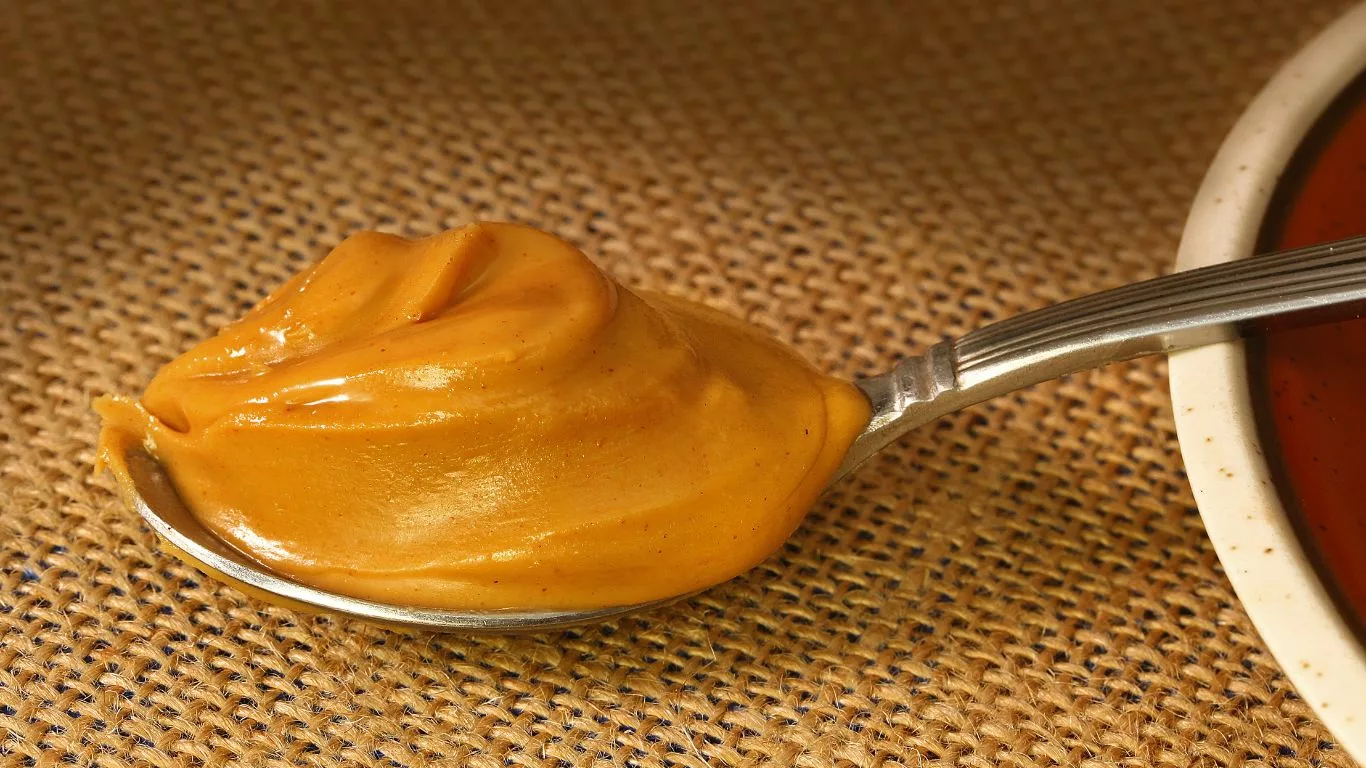Peanut Butter’s Cholesterol Impact: A Nutrient-Rich Analysis
Discover the impact of peanut butter on cholesterol levels. Learn about its heart-healthy fats, nutrients, and ways to incorporate it into your diet for optimal health.
Introduction
Cholesterol, a vital component of our body’s cellular structure, has a significant impact on our overall health, especially heart health. As a key factor in heart disease risk, cholesterol management is a crucial consideration in maintaining a healthy lifestyle. Amidst the diverse array of dietary choices available, one food item that often garners attention is peanut butter. This comprehensive article delves deep into the intricate relationship between peanut butter and cholesterol, delving into its intricate impact on both LDL and HDL cholesterol levels. Additionally, it presents invaluable insights into prudent dietary decisions for individuals seeking to optimize their cholesterol profile.
Understanding Cholesterol and Its Importance
Cholesterol, often misunderstood as a solely detrimental substance, is, in fact, an essential component for various bodily functions. It forms the building blocks of cell membranes, aids in the production of hormones, and plays a role in synthesizing vitamin D. Within the context of heart health, cholesterol is divided into two primary categories: LDL cholesterol, often dubbed “bad” cholesterol due to its propensity to accumulate within arterial walls, and HDL cholesterol, referred to as “good” cholesterol as it shuttles excess cholesterol away from arteries, reducing the risk of heart disease.
Exploring Dietary Influences on Cholesterol Levels
Diet constitutes a pivotal determinant in cholesterol management. The consumption of foods rich in saturated and trans fats is closely associated with increased LDL cholesterol levels, accentuating the risk of cardiovascular issues. Conversely, a diet incorporating heart-healthy fats, particularly monounsaturated and polyunsaturated fats, can engender a positive effect on cholesterol levels.

Peanut Butter’s Impact on Cholesterol
Nutritional Breakdown of Peanut Butter
Peanut butter, a delectable spread derived from ground peanuts, emerges as a nutrient powerhouse. A standard 2-tablespoon serving encompasses an approximate 8 grams of monounsaturated and polyunsaturated fats. These fats, well-regarded for their salutary effects on cholesterol, contribute to maintaining a favorable lipid profile.
Effects of Peanut Butter on LDL Cholesterol
Intriguingly, scientific investigations have illuminated the potential of peanut butter in reducing LDL cholesterol levels. The amalgamation of monounsaturated and polyunsaturated fats within peanut butter appears to foster a reduction in LDL cholesterol, thereby mitigating the risk of heart disease. A study published in the “Journal of the American College of Nutrition” demonstrated that participants who consumed peanut butter exhibited a reduction in LDL cholesterol levels.
Role of Peanut Butter in Boosting HDL Cholesterol
Beyond its LDL-lowering attributes, peanut butter also exhibits the capacity to elevate HDL cholesterol levels. The harmonious interplay of healthy fats and protein within peanut butter culminates in the augmentation of HDL cholesterol, a cornerstone of cardiovascular health.
Managing Triglyceride Levels with Peanut Butter
Peanut butter’s contribution to heart health extends to the realm of triglycerides. Elevated triglyceride levels, emblematic of an increased heart disease risk, can be effectively managed through the judicious inclusion of peanut butter in the diet. The composition of healthy fats within peanut butter plays a pivotal role in moderating triglyceride concentrations.
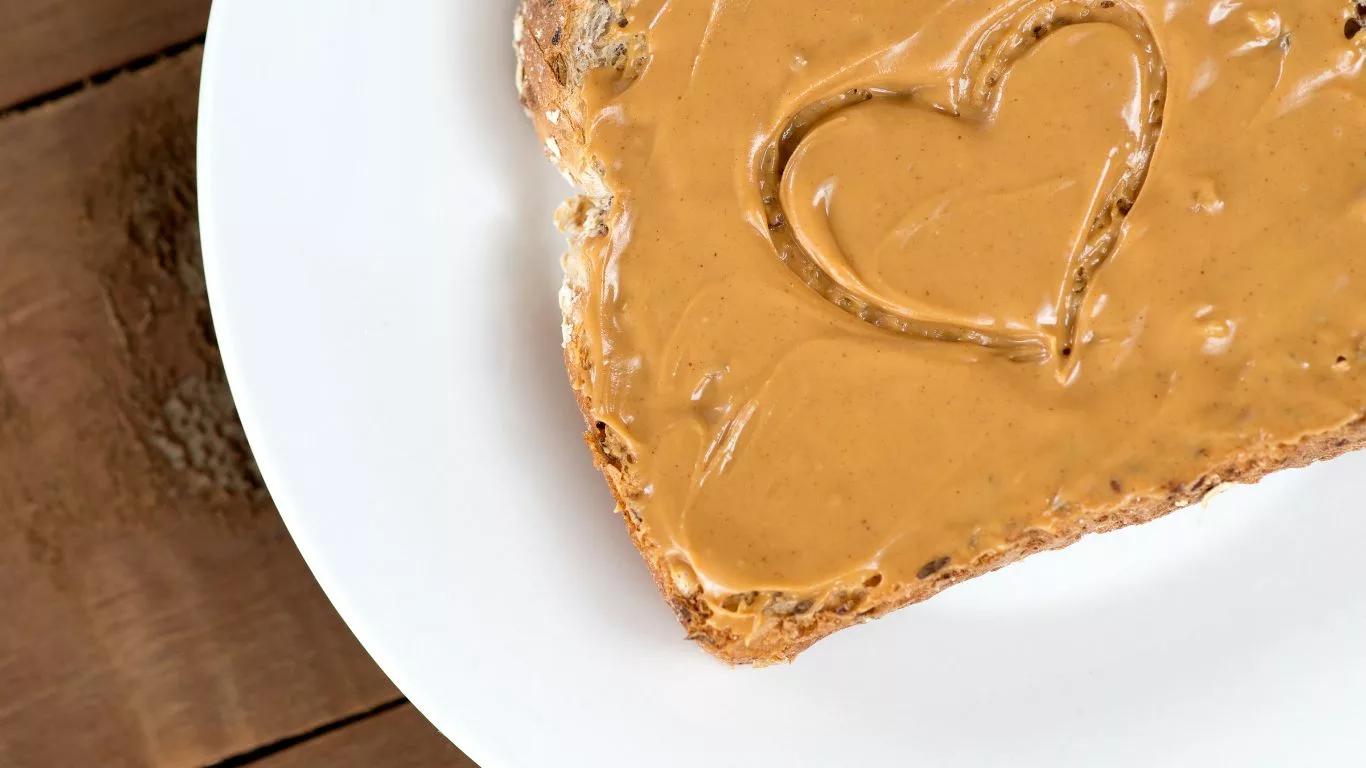
Healthy Fats in Peanut Butter
Monounsaturated Fats: The Heart-Healthy Component
Central to peanut butter’s nutritional allure is its richness in monounsaturated fats. These fats, acclaimed for their salubrious impact on heart health, foster a reduction in LDL cholesterol levels. Additionally, monounsaturated fats confer anti-inflammatory and antioxidant benefits, further fortifying cardiovascular well-being.
Polyunsaturated Fats and Their Cholesterol Benefits
Peanut butter emerges as a valuable source of polyunsaturated fats, encompassing both omega-3 and omega-6 fatty acids. These essential fats orchestrate a multifaceted symphony of cardiovascular advantages, encompassing the lowering of LDL cholesterol, reduction of inflammation, and maintenance of arterial elasticity.
Peanut Butter vs. Saturated and Trans Fats
The nutritional divergence between peanut butter and saturated or trans fats is a noteworthy consideration. Whereas saturated and trans fats are notorious for their deleterious influence on cholesterol levels, peanut butter encapsulates a contrasting narrative. The replacement of saturated and trans fats with peanut butter facilitates a constructive shift in the lipid profile, underscoring the importance of prudent dietary swaps.
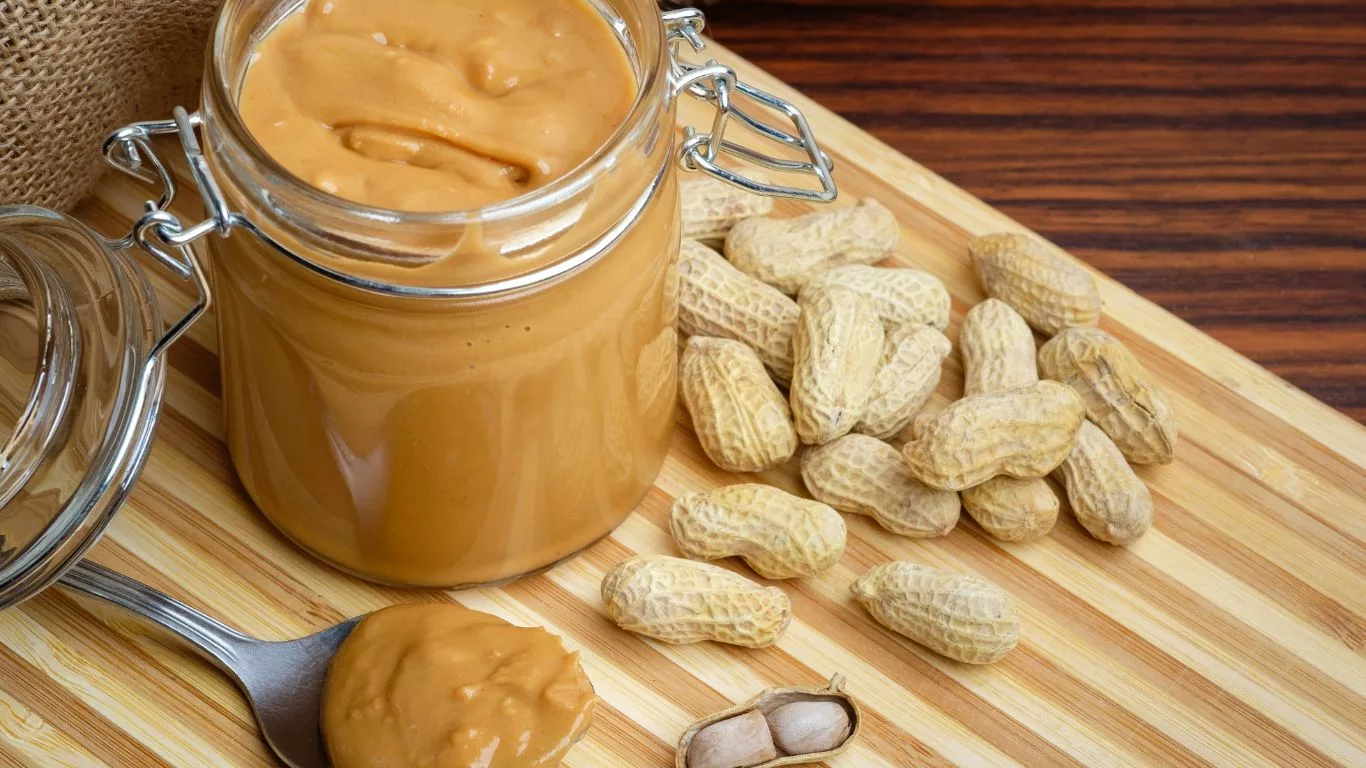
Nutrients Supporting Cholesterol Health
Fiber: How Peanut Butter Contributes to Cholesterol Balance
The fiber content within peanut butter contributes significantly to cholesterol management. Dietary fiber, an indigestible component, impedes cholesterol absorption within the gastrointestinal tract, thereby contributing to a reduction in LDL cholesterol levels. The incorporation of fiber-rich peanut butter into the diet epitomizes a potent strategy for cultivating heart health.
Protein’s Role in Cholesterol Management
Protein, a fundamental macronutrient within peanut butter, orchestrates a range of physiological processes, including cholesterol regulation. Research underscores the pivotal role of protein in augmenting HDL cholesterol levels and influencing the distribution of LDL particles, subsequently influencing the risk of heart disease.
Vitamins and Minerals Enhancing Heart Health in Peanut Butter
Peanut butter’s nutritional portfolio extends beyond fats and protein, encapsulating an array of vitamins and minerals pertinent to cardiovascular well-being. Vitamin E, an antioxidant, confers protective effects on arteries, while magnesium and potassium contribute to blood pressure regulation, collectively fostering heart health.

Incorporating Peanut Butter in a Cholesterol-Conscious Diet
Smart Serving Sizes for Cholesterol Benefits
While the virtues of peanut butter are unequivocal, moderation remains an indispensable tenet. The calorie density of peanut butter necessitates judicious portion control to optimize cholesterol benefits while mitigating caloric excess.
Pairing Peanut Butter with Whole Grains for Optimal Results
The synergy between peanut butter and whole grains epitomizes a harmonious marriage for cholesterol-conscious individuals. The amalgamation of healthy fats from peanut butter and the fiber-rich milieu of whole grains engenders a satiating, heart-protective culinary union.
Nut Butter Variety: Alternatives and Their Cholesterol Effects
Acknowledging individual preferences and dietary constraints, the realm of nut and seed butters presents an array of alternatives to traditional peanut butter. Almond butter, cashew butter, and sunflower seed butter proffer analogous cardiovascular benefits, affording flexibility in choice.
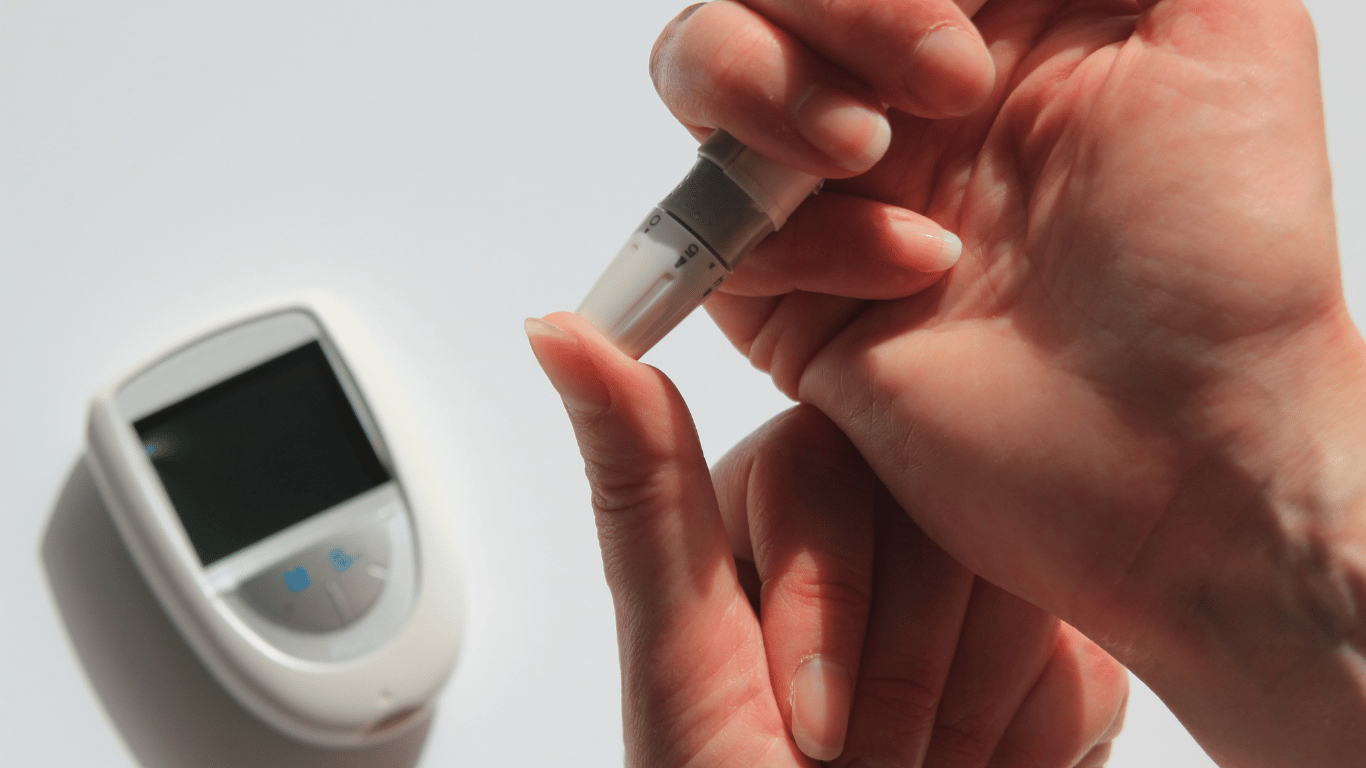
Practical Tips and Recipes
Creative Ways to Include Peanut Butter in Meals
Peanut butter’s versatility renders it a culinary chameleon, amenable to diverse gastronomic applications. Embrace its creamy decadence as a spread, a dip, or an ingredient in a myriad of recipes, harnessing its cholesterol-modulating potential.
Quick and Healthy Peanut Butter Snack Ideas
Satiate between-meal cravings with a plethora of peanut butter-infused snacks. Apple slices adorned with peanut butter, celery sticks generously smeared with its nutty goodness, or whole grain crackers complemented by a dollop of peanut butter exemplify convenient and heart-healthy choices.
Peanut Butter Smoothies for a Nutrient-Packed Breakfast
Elevate your mornings with a nutrient-dense peanut butter smoothie, harmonizing convenience and health. The amalgamation of peanut butter, Greek yogurt, fruits, and a splash of almond milk furnishes a symphony of flavors, protein, and healthy fats for a cholesterol-friendly breakfast.
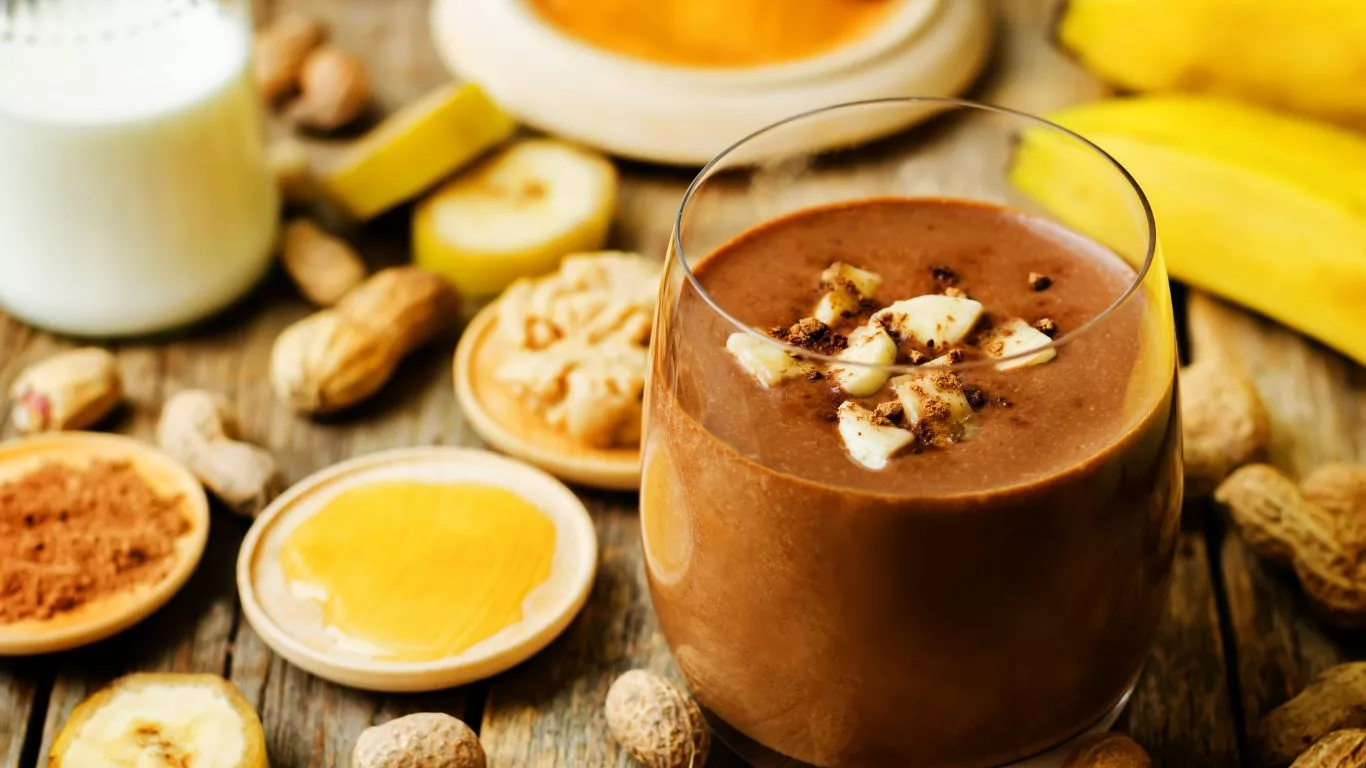
Considerations and Caution
Monitoring Sodium Content in Peanut Butter Choices
While basking in the nutritional spotlight, peanut butter occasionally harbors added sodium, a parameter warranting vigilance. Opting for low-sodium variants safeguards against excessive sodium intake, supporting blood pressure management and cardiovascular health.
Allergies and Other Peanut Butter-Related Concerns
For individuals navigating the realm of peanut allergies, the pursuit of heart health necessitates alternative nut or seed butters. Almond butter, cashew butter, or sunflower seed butter afford comparable nutritional advantages, serving as viable alternatives for those precluded from peanut consumption. Furthermore, consulting a healthcare professional before embarking on significant dietary shifts is a prudent step, particularly for individuals with preexisting health conditions.
Conclusion
In the intricate tapestry of dietary choices, peanut butter emerges as an artful brushstroke contributing to heart health. Its composite of healthy fats, protein, fiber, and micronutrients collectively foster a landscape conducive to optimal cholesterol levels. By amalgamating scientific insights with judicious dietary decisions, individuals can wield peanut butter as a culinary ally in the pursuit of cardiovascular well-being. Embracing moderation, diversification, and informed dietary practices, peanut butter conveys its legacy as a wholesome conduit to a cholesterol-conscious lifestyle.

Appendices
References
- Mozaffarian, D., & Wu, J. H. (2011). Omega-3 fatty acids and cardiovascular disease: effects on risk factors, molecular pathways, and clinical events. Journal of the American College of Cardiology, 58(20), 2047-2067. https://pubmed.ncbi.nlm.nih.gov/22051327/
- Kris-Etherton, P. M., Pearson, T. A., Wan, Y., Hargrove, R. L., Moriarty, K., Fishell, V., … & Etherton, T. D. (1999). High-monounsaturated fatty acid diets lower both plasma cholesterol and triacylglycerol concentrations. The American Journal of Clinical Nutrition, 70(6), 1009-1015. https://pubmed.ncbi.nlm.nih.gov/10584045/
- Kris-Etherton, P. M., Hu, F. B., Ros, E., Sabaté, J., & Ebbeling, C. B. (2008). The role of tree nuts and peanuts in the prevention of coronary heart disease: multiple potential mechanisms. The Journal of nutrition, 138(9), 1746S-1751S. https://www.sciencedirect.com/science/article/pii/S0022316622099436
FAQs
Q1: Is peanut butter a good source of healthy fats?
A1: Yes, peanut butter is rich in monounsaturated and polyunsaturated fats, which have been shown to have positive effects on cholesterol levels and heart health.
Q2: Can peanut butter help lower LDL cholesterol?
A2: Research suggests that the healthy fats in peanut butter, along with its other nutrients, may contribute to reductions in LDL cholesterol levels.
Q3: Are there alternatives to peanut butter for those with allergies?
A3: Yes, individuals with peanut allergies can consider almond butter, cashew butter, or sunflower seed butter as alternatives.
Q4: How much peanut butter should I consume for cholesterol benefits?
A4: Moderation is key. A serving of around 2 tablespoons per day can provide the benefits of healthy fats and nutrients without excessive calorie intake.
Disclaimer: The information provided in this article is for educational and informational purposes only. It is not intended as a substitute for professional medical advice, diagnosis, or treatment. Always seek the advice of a qualified healthcare provider with any questions you may have regarding a medical condition. The author and publisher of this article are not responsible for any adverse effects or consequences resulting from the use of any information provided herein.

Camellia Wulansari is a dedicated Medical Assistant at a local clinic and a passionate health writer at Healthusias.com. With years of hands-on experience in patient care and a deep interest in preventive medicine, she bridges the gap between clinical knowledge and accessible health information. Camellia specializes in writing about digestive health, chronic conditions like GERD and hypertension, respiratory issues, and autoimmune diseases, aiming to empower readers with practical, easy-to-understand insights. When she’s not assisting patients or writing, you’ll find her enjoying quiet mornings with coffee and a medical journal in hand—or jamming to her favorite metal band, Lamb of God.

